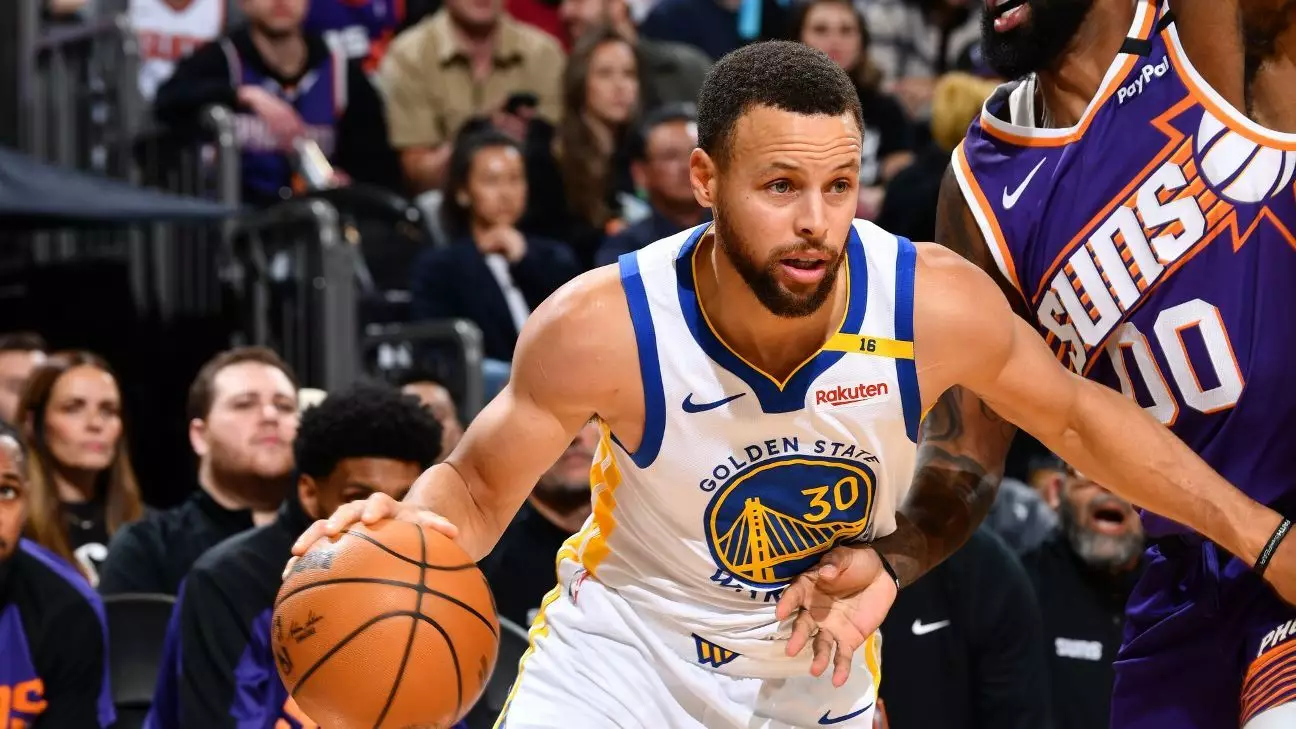In the fast-paced world of professional sports, athletes face numerous physical challenges, with injuries being a prominent concern. Recently, Stephen Curry, the prolific guard for the Golden State Warriors, has been navigating the ramifications of tendinitis in both knees. This condition, which he admitted is unfamiliar territory for him, has necessitated a careful approach to his training and gameplay. The need for proactive management is crucial, especially for someone like Curry, who has built a career that thrives on agility and explosive movement.
Curry’s knee issues come during a critical juncture in the NBA season where maintaining player health is paramount. The discomfort he experienced led to his absence in a previous game against the Oklahoma City Thunder and has drawn attention to the often invisible battles athletes endure. Curiously, Curry remains characteristically optimistic about the situation, emphasizing that he is focused on keeping the tendinitis from becoming a “nagging” issue that could affect his performance in the long run.
To combat this emerging challenge, the Warriors’ Vice President of Player Health and Performance, Rick Celebrini, has devised a specialized protocol meant to preemptively address Curry’s condition. What stands out in Curry’s remarks is a clear understanding of the balance between performance and health. He recognizes that as he advances in his career, the likelihood of encountering injuries increases. Nevertheless, he asserts confidence in the strategies put in place for recovery, stating that he feels strong and capable even as he navigates through rehabilitation protocols.
Curry’s recent return to the court against the Phoenix Suns, despite a loss, is illustrative of this commitment. He managed to score 23 points over 32 minutes, showcasing his intrinsic ability as a player. However, his performance was shadowed by a sluggish start, where he struggled with shooting accuracy, reflecting perhaps the ongoing adjustments he is making as he learns to cope with his condition.
The Warriors are at a crucial juncture where team dynamics and individual player health are intertwined. Coach Steve Kerr’s comments regarding Curry’s age—36—underscore the necessity for a thoughtful and calculated approach to managing the veteran’s on-court minutes. Kerr’s acknowledgement of the “process of getting older” resonates with a broader issue within professional sports, where athlete longevity often clashes with the pursuit of victory.
Moreover, the cooperative effort between Curry, the coaching staff, and the medical team portrays a transparent and strategic approach to injury management. It’s crucial, especially as the Warriors aim to reverse a four-game losing streak and seek a competitive edge in a league that is unforgiving to those who are not at their peak performance. With upcoming matchups, such as their next game against the Denver Nuggets and two-time MVP Nikola Jokic, the necessity to balance health and performance becomes increasingly significant.
Looking Ahead
As Curry prepares for his next challenge, the underlying message is one of resilience and adaptability. He is aware that the road to recovery requires both patience and self-advocacy. His acknowledgment of the need for potential game rests—whether through skipping back-to-back matchups or modifying his playing time—demonstrates a mature understanding of his physical limits and the importance of recovery.
Stephen Curry’s experience with knee tendinitis serves as a reminder of the hidden struggles athletes face behind the scenes. His engagement with the Warriors’ medical team, prioritization of health, and clarity about his performance expectations exemplify an evolving mindset in an athlete’s career. As he navigates this chapter, there lies hope for not only Curry’s quick recovery but also a renewed strength for the Warriors as they aim to overcome their recent challenges on the court.

